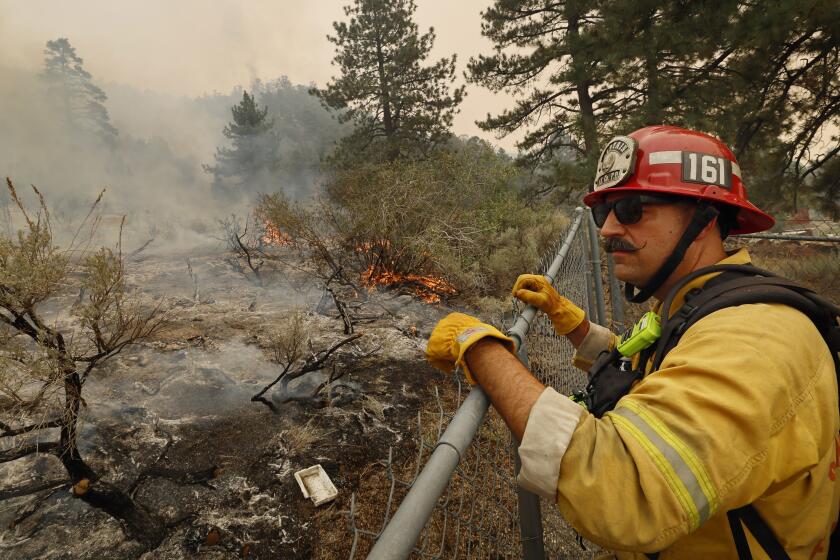Hotel detox: For affluent addicts
By almost any measure, the heroin addiction treatment a prominent rock star underwent earlier this year was unorthodox.
For one thing, it took place not at a licensed clinic but at the Peninsula Hotel, the five-star center of Hollywood deal-making located in the heart of Beverly Hills. For another, the patient was spotted during the course of treatment ordering a Jack Daniels at the hotel bar.
Although the opiates used for treatment were supposed to be securely locked in a safe in the hotel room, the patient said he had no trouble gaining access to them at will.
Finally, the treatment was woefully ineffective. Within weeks the rock star, who spoke with The Times on condition that he not be named, was undergoing heroin detoxification again.
As unconventional as the star’s weeklong sojourn at the Peninsula might have been, it was not unique.
So-called “hotel detoxes” at the Peninsula, the Four Seasons and other Westside luxury hotels have become a lucrative practice for physicians catering to the entertainment industry’s rich and celebrated.
Hotel detox is flourishing even though state medical authorities say it is illegal in many cases and experts in the field say it is almost guaranteed to fail. Its availability and popularity highlight one reason why an enduring drug problem afflicts some of Hollywood’s prominent executives and stars--people with the wherewithal and power to set the terms of their own treatment, often to their own disadvantage.
Among them: rock star Kurt Cobain, who underwent at least two unsuccessful hotel detoxes before succumbing to a long-standing heroin addiction and committing suicide in 1994, and film producer Don Simpson, who was detoxed five times at his Bel-Air estate before dying of an overdose in 1996.
In scores of interviews with chemical dependency experts, entertainment industry sources and former drug addicts, The Times found that a small group of physicians has been using Los Angeles’ most luxurious hotels to detox celebrity addicts since the mid-1980s, when the practice was pioneered by maverick addiction specialist Dr. Robert P. Freemont.
Over the last few years the white limestone Peninsula Hotel, at Wilshire and Santa Monica boulevards, has won a reputation as the cushiest place in town to try to kick a drug habit.
That is largely the work of David A. Kipper, a Beverly Hills internist whose Lasky Drive office faces the hotel’s rear entrance. Kipper, who treated the anonymous rock star, told The Times that he has conducted 100 such procedures at the hotel in a span of 24 months, weaning patients from a variety of addictive substances ranging from prescription painkillers to heroin. (In a follow-up letter he amended the claim to 40 procedures.)
State authorities say that conducting drug detoxification in an unlicensed facility such as a hotel violates the state health and safety code. State law also prohibits the use of an opiate to detox narcotic addicts--a rule flouted by Kipper, who told The Times he uses the synthetic opiate buprenorphine to wean his patients from heroin.
“I would bet it’s not completely legal,” Kipper said in an interview at his office. “But it’s a gray area, and the reality is, it works.”
Kipper said he has kept the Peninsula management fully apprised of what he does. But the hotel’s management and owners said Kipper never told them he was conducting a medical procedure on the property. After inquiries by The Times, the Peninsula said it had “put a temporary freeze on all doctor-referred patients until we can better understand this situation.”
Kipper’s fee, from $10,000 to $19,000 per week of treatment (not including the hotel rate of up to $800 a night per room), is exorbitant by the standards of addiction medicine. It is several times the rate charged by such nationally recognized clinics as the Betty Ford Center in Rancho Mirage and Arizona’s Sierra Tucson for programs combining detoxification and weeks of rehab therapy.
Kipper said the fees are high in part because his program is administered by an exceptionally qualified and costly staff--and that the steep price has some therapeutic value.
“I work in a community where people pay top dollar,” he said. “My detox program is probably the most expensive one in the city.” Addicts under treatment, he added, need to have the consequences of their behavior brought home to them. “There has to be a price to be paid. I hate to see that it is financial, yet that is one way to make people wake up and pay attention.”
Entertainers Can Be a Challenge to Treat
But other addiction experts criticize Kipper’s program for its expense and setting.
“It’s outrageous to charge a patient so much money simply to detox them--no matter how rich they are,” said Dr. Drew Pinsky, medical director of the chemical dependency program at Las Encinas Hospital in Pasadena.
“To feed an addict’s need for special treatment with such pomp and circumstance is counter-therapeutic,” he said. “From an ethical point of view, it seems to be taking advantage of people who are desperate to get better, people who are trying to hide their illness and not confront the painful reality of their disease.”
There are no statistics showing that drug and alcohol addiction afflicts entertainment figures more than the population at large. But treating them can present unusual problems. Stars often have the money and power to fend off therapy or to insist on setting the terms of their treatment. Their money and prominence may also expose them to greater temptation than the average person, said some Hollywood veterans.
“Entertainers can get away with anything they want,” said Danny Sugerman, former manager of The Doors rock group and a recovering addict himself. “And the successful ones have unlimited funds. On the road the temptations and expectations create more pressure. That’s why relapses are so common.”
Prominent stars and executives also commonly surround themselves with teams of “enablers”--friends and employees inclined to satisfy their whims. This coterie sometimes includes star-struck medical professionals willing to overprescribe dangerous and addictive drugs.
Others say the relentless pressure from entertainment corporations to meet deadlines for production and touring can make it difficult or impossible to fulfill the six- or nine-month rehabilitation commitment that experts say is necessary to have a strong chance of staying sober.
“Celebrities want to go through detox and go back to work,” said Dae Medman, executive director of the Sherman Oaks-based Entertainment Industry Referral and Assistance Center, which works with studios and unions to help employees overcome chemical dependency. “They’re not provided the opportunity for rehabilitation.”
The result is a “quick-fix” mentality that places a high premium on detoxification--a “drying out” process over several days that cleans drugs out of an addict’s system but fails to address the underlying causes of addiction as a disease.
Most experts agree that successful rehabilitation depends on an effective detox and on providing the recovering addict with a secure environment free from temptation and with sustained psychological support.
“People don’t understand that drying out is easy,” said Dr. Max A. Schneider, professor of psychiatry and human behavior at UC Irvine and past president of the American Society of Addiction Medicine. “The hard part is not getting wet again.”
Treatment Pioneer Known as a Maverick
Experts are divided over whether treatment should include a punitive or humbling element to give addicts an incentive to avoid further drug use or whether it is more humane for treatment to proceed in the least painful and most comfortable environment possible.
The humane argument was one rationale behind Freemont’s work in hotel therapy.
Freemont, who ran the chemical dependency unit at Beverly Hills Medical Center before his death in 1993, sought to develop a painless and discreet alternative for celebrity patients who refused to enter conventional drug rehab. He established a reputation in Hollywood as a maverick addiction specialist offering a way to wean celebrities off heroin while protecting their anonymity.
By the early 1990s, Freemont had detoxed a string of rock stars at such hotels as the Beverly Prescott and the Chateau Marmont. Many of his patients returned as repeat customers after their initial treatment failed, sources said.
Former Three Dog Night singer Chuck Negron said Freemont’s program failed to help him kick his habit.
“They detoxed me and then sent me out on the road with different medications that were legal,” Negron said. “At one point, I ended up having a bigger habit on the prescription stuff than when I first checked in. Freemont had this prescription cocktail, and when you got excited they would hold you down and give you a shot. And let me tell you, that shot was better than any dope I ever scored on the street.”
In 1993, the Medical Board of California charged Freemont with gross negligence and unprofessional conduct for allegedly overprescribing drugs--including buprenorphine--and administering medications without proper follow-up exams. He died before the board finished its investigation, and the case was dismissed.
The hotel detox business was then taken up by several Westside physicians who checked celebrities into such high-end hotels as the Four Seasons, Nikko, Century Plaza, Miramar Sheraton and Beverly Hills Hotel, sources said. The hotels were unaware that addicts were being detoxed on their premises, according to doctors and hotel managers.
The physicians include Michael Horwitz, former head of Cedars-Sinai Medical Center’s chemical dependency unit; Michael Meyers, former medical director of Brotman Medical Center in Culver City; Milton Birnbaum, director of addiction medicine at Steps rehabilitation center in Oxnard; and Stephen Patt, an internist who detoxes addicts for the Promises treatment center in Malibu.
These doctors said they employed the treatment in their private practices and only as a last resort to help a patient who adamantly refused to enter a hospital or licensed rehabilitation center. None of them charged more than $1,000 per day (including the hotel room) and none used buprenorphine for detox, sources said.
Some of the doctors have supervised hotel detoxes recently. Birnbaum and Patt told The Times they found the technique ineffective, especially when compared with comprehensive detox and rehabilitation programs at well-supervised clinics.
“It’s much safer to detox somebody in a hospital,” Birnbaum said. “The controls in a hotel are not good. The patient could have a seizure. They could have a heart attack or have someone bring them drugs. I’ve had addicts literally get up and leave the hotel room--despite nurses being in attendance--and go out and cop heroin in the lobby.”
Said Patt: “The only thing positive I can say about hotel detoxes is that sometimes they act as a steppingstone to a later detox at a licensed inpatient facility.”
Kipper has embraced the hotel method. The 50-year-old UCLA-trained internist, who took over the practice of the late Dr. Elsie Giorgi, a well-known physician-to-the-stars, began checking addiction patents into the Peninsula in 1996. He said about half his addiction treatments are for heroin; most of the rest are for prescription drug addictions, with a handful for alcohol.
In the anonymous rock star’s case, Kipper prepared a contract identifying his service as the PENN Project, a term he said specifically referred to the Peninsula. A copy examined by The Times covered a 14-day detox for a fee of $38,360, including $18,000 for Kipper’s medical services, $17,360 for 24-hour nursing and $3,000 for “support staff and administrative.” The hotel room was extra. The treatment ended up being extended for six weeks, covering several attempts at detox. Kipper billed the patient about $90,000 before it was over, sources said.
Kipper said the contract covered two weeks during which the star was on a maintenance program to keep him off heroin. The doctor said the case was unique, describing the entertainer as “the most recalcitrant patient we’ve ever treated.”
The cost varies from patient to patient, Kipper said, depending on how many nurses, counselors, therapists and other professionals he employs to help conduct the detox. Typical charges run from $10,000 to $14,000 a week, but can go as high as $19,000, he said. Despite the price, Kipper said his treatment method is so popular that during one week this year he was detoxing four addicts in separate rooms around the Peninsula.
Kipper said his program includes round-the-clock nurse supervision as well as visits from a psychiatrist, a physical therapist and a group of recovering addicts who are invited to encourage the patient to enter a rehabilitation program. In some cases, he also brings in a nutritionist, an acupuncturist and an art therapist to aid a patient’s progress.
Candy Finnigan, a certified drug counselor who works with Kipper, said his program is unique in the detox field.
“I don’t think Dr. Kipper is ripping anybody off,” she said. “This isn’t just a spin-dry approach where he’s shoving people in there and then hanging them out to dry. This man is a dedicated professional. I find not a flaw in his commitment.”
Some patients have responded well to his treatment. One is Karen Rosenthal, a businesswoman whose history of migraines had left her addicted to a wide range of painkillers.
After rejecting a counselor’s suggestion that she check into a rehabilitation clinic, she turned to Kipper with the request that he supervise her detoxification during a weeklong stay at the Peninsula with 24-hour nursing care. She said that the program was a success and that she has stayed off drugs for the last 18 months.
“Without his intervention, I probably would have died,” she said.
‘Not Doing Anything Avant-Garde’
The rock star who ordered Jack Daniels at the hotel bar, however, told The Times he thought Kipper’s program was ineffective and too costly.
He said he relied on Kipper’s representation of himself as an expert in addiction medicine but now questions whether the doctor might have taken advantage of him, “considering the vulnerable state that I was in when I entered the program.”
As a licensed physician, Kipper can legally conduct conventional detoxification therapy, but some experts in the field say those with addicts under their care should be specially trained and certified by the American Society of Addiction Medicine. The country’s leading organization of addiction experts, it certifies those who pass a test demonstrating familiarity with the latest clinical developments in the field.
Asked in an interview whether he was certified by the society, Kipper replied, “I’d have to say no, because I don’t know what it is.”
Kipper argues that in his treatment program “we are not doing anything avant-garde.” He said he treats narcotic addicts with intravenous solutions of dextrose and vitamins, followed by detoxification with a combination of drugs--including buprenorphine, clonidine and depacote. He said he will not agree to start the treatment unless the patient agrees in advance to enroll in a rehabilitation program for at least 30 days after treatment.
“Detoxing people is a very separate issue than getting people to stay sober,” Kipper said. “They are really two very different parts of the puzzle. I focus on the detox part and then, depending on who they are and what they need, I send them to a variety of places such as Betty Ford and Sierra Tucson.”
Kipper, who said he has been practicing internal medicine in Beverly Hills for more than 25 years, said the detox program is only one aspect of his medical practice. He said none of his detox patients has ever experienced a medical emergency at the hotel.
Shifting Definition of Success in Program
Kipper told The Times in an interview that his program has a 70% success rate, which he defined as patients having no relapses for a year. In a follow-up letter, he said, “We consider a detoxification successful only when patients are admitted and maintained in a treatment facility for one month after leaving our supervision,” a much less rigorous standard.
“Ninety days [of treatment] keeps cropping up as a critical threshold,” said Dr. Norman Hoffmann, an associate professor of public health at Brown University who has conducted a study of 15,000 alcoholism and drug addiction patients. “Anything less than three months is essentially useless.”
Hoffmann said he found implausible Kipper’s claim that 70% of his patients stayed clean for a year.
“Maybe if all his patients are airline pilots, who are highly regulated, closely scrutinized, and have a hell of a lot to lose,” he said. Among a population of affluent entertainment professionals with largely unstructured daily lives, “I’d believe that figure as soon as I’d believe in Santa Claus or the tooth fairy.”
Hoffmann said 65% of patients undergoing weekly counseling for six months after detox remain drug-free for at least a year.
Hotel detox programs raise several concerns for state medical authorities.
The California Uniform Controlled Substances Act specifically forbids treatment for narcotic addiction anywhere but in a hospital or a facility approved by the state Department of Health Services.
“There is a reason we have licensed chemical detoxification programs in this state,” said Marc Gonzalez, a supervising investigator with the state medical board. “Strict protocols must be followed in a controlled environment by qualified people who know how to properly treat potentially life-threatening withdrawal symptoms--and that doesn’t come in a hotel room. Hotel rooms do not fall under the law.”
Gonzalez added, “Based on my interpretation of California law, it is not appropriate to detox someone from heroin or any addictive prescription drug except in a licensed facility or a physician’s office.”
Officials said the law also prohibits doctors from detoxing a patient at a residence, where experts say an addict may be able to exert even more control over his treatment than at a hotel. The dangers of home detoxification came to light after the 1996 overdose death of producer Simpson.
The medical board has since filed an accusation against Westside psychiatrist Dr. Nomi J. Fredrick for overprescribing drugs to Simpson and for helping to maintain and operate an “unlicensed chemical detoxification program” at Simpson’s Bel-Air home. That program ended in 1995 when another physician involved in the treatment was found dead of a morphine overdose in the producer’s pool house. Simpson died six months later from an overdose of 21 drugs at the same residence.
Moreover, state and federal law closely regulates the conditions under which doctors can administer opiates to narcotic addicts.
Although treating heroin addiction with buprenorphine is an accepted practice in Europe, it is not legal in the United States, where the drug can legally be administered to addicts only for pain relief, not for detoxification, except in clinical trial settings.
In a Sept. 14 letter to The Times, Kipper said that buprenorphine is used “specifically for heroin detoxification and remains the standard for therapy for treating acute opiate withdrawal.” On Friday, however, Kipper told The Times that he was careful to record on the patient’s medical chart that he was prescribing the drug for pain relief--the only legally permissible application.
“You don’t write down in the chart that you are giving [buprenorphine] for detox,” Kipper said. “You write down in your charting that you are using it for pain management. However the semantics are written, it keeps these guys comfortable and keeps them from drug seeking.”
Offering a ‘Safe, Not a Sterile, Environment’
How well informed the Peninsula and its staff were of Kipper’s activities is unclear.
The hotel’s general manager, Ali V. Kasikci, told The Times in an interview that he had the impression Kipper was checking patients into the hotel for preoperative comfort and postoperative recuperation--as many other local physicians do with affluent patients facing surgical procedures.
“I was shocked and disappointed to learn that physicians in this community would engage in any alleged unauthorized practice at the hotel,” he wrote in a letter to The Times. “We have asked our attorneys to look into this matter, and to take whatever legal action is necessary to prevent any further use of the Peninsula’s facilities or name associated with this practice.”
He said Kipper has been instructed not to refer any further patients to the hotel until the Peninsula can investigate the legality of his program.
Kipper told The Times that security officials at the hotel were specifically notified of the location of each of his detox patients. On at least one occasion, he said, he arranged for the bartending staff to be instructed not to serve liquor to a patient.
A nurse who worked with Kipper’s patients said she believed the activities were well-known to the staff. “The front desk recognized most of the nurses,” she said.
Kipper said the hotel had even furnished him with a key to its back door. But Kasikci said Kipper is not authorized to use a hotel key. “It won’t matter if he does have it; the locks will be changed in two hours,” he said Thursday.
Another element of Kipper’s program that draws skepticism is allowing patients to use such hotel amenities as the spa and pool, where they can come into unregulated contact with other guests. That violates accepted wisdom in the field that addicts in treatment should remain in a sequestered environment where they can obtain psychosocial support from experienced professionals and avoid the temptation to backslide.
But Kipper insisted that he maintains an appropriate level of security for his patients. “I want to keep them in a safe, not a sterile, environment,” he said.
Although Kipper has never advertised his treatment program, he said demand is so great that he turns patients away. “There is a reason why we are so successful and busy,” he said. “It’s because we have the best program out there.”
For the Record
In a February court filing seeking medical records,the California Medical Board raised questions about psychiatrist Dr. NomiFredrick’s treatment of Hollywood producer Don Simpson. The Timesincorrectly reported Sunday in an article on hotel drug detoxificationthat the board had filed a formal accusation.
More to Read
Sign up for Essential California
The most important California stories and recommendations in your inbox every morning.
You may occasionally receive promotional content from the Los Angeles Times.










